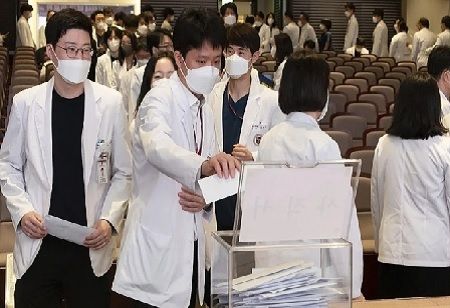- South Korean medical students were suspended for failing to register amid year-long protests
- The protests, sparked by concerns over working conditions and uneven doctor distribution
- The government has postponed the admission quota hike for 2026
Approximately 8,300 of South Korea's medical students, about 40% of all such students, were suspended after ignoring warnings from the Ministry of Education for year-long protests against a planned expansion in medical school enrollment.
The Ministry of Education announced the numbers over the weekend, saying that the students failed to register prior to the April 30 deadline for the spring term.
South Korea now has over 19,400 students studying in 40 medical and pharmacy schools. Apart from the students retained, 46 were expelled, and over 3,000 pre-med students were given warnings, The Korea Herald said.
Only some 6,700 students, or 34.4% of the number, are studying in full. The rest have enrolled for only one subject, reportedly to escape academic sanctions.
Most South Korean medical schools have attendance policies under which students automatically fail if they miss over a third or in some cases, a quarter of the total number of class hours.
The protest started in March last year when the government tabled a plan to increase the number of annual medical school admissions from 3,000 to 5,000 to address a shortage of healthcare workers.
Authorities had claimed that there were not enough doctors, particularly for rural and under-served communities. But numerous professionals in the medical industry insisted that substandard remuneration and working conditions were the true factors affecting healthcare provision and should be resolved as a priority.
In January, the health ministry indicated that around 90% of trainee doctors, of 13,531 who were eligible, had quit their hospital jobs, as reported by Reuters.
Along with doctors, medical students vigorously opposed the quota hike, claiming that the source of the issue was not the quantity of doctors, but uneven distribution, challenging working conditions, and deeper systemic issues.
Following over a year of deadlock, the government consented in April to postpone the scheduled admission quota hike for 2026, subject to doctors and students returning to hospitals and classrooms.
"His government's stand on raising the quota for the medical school is still unchanged," Education Minister Lee Ju-ho was cited by Reuters in March.
The country's principal doctors' lobby organization, the Korean Medical Association, said it would be the students who would have to decide whether or not to accept the offer from the government. It however referred to the plan to expand the quota as a "failed policy" and urged for reopening of talks.
As per the Organization for Economic Co-operation and Development (OECD), South Korea possesses one of the lowest rates of doctors to patients among all developed nations, with only 2.6 doctors per 1,000 inhabitants.

